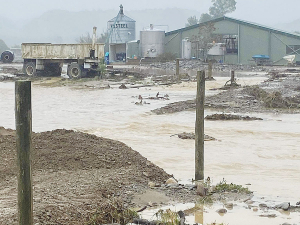The recent floods on the West Coast hit farmers much harder than last July's downpour, says West Coast Federated Farmers president Bede O'Connor.
He says these recent floods were more of a rural event, whereas the July event was "urban".
O'Connor says the recent event has affected a lot more places, especially those around Reefton, Inangahua, at Shenandoah, Springs Junction and in the lower Buller area where he farms and which was badly hit in July as well.
"Reefton and Inangahua didn't get that badly affected in July, but this time they have taken the brunt of the storm," he told Dairy News.
"There is quite a bit of infrastructure damage with fences and tracks gone and some have had access to run-offs cut as well.
"There have also been a number of coastal farms that have been affected by streams blowing out and changing course on farms or running over paddocks. They aren't even anywhere near the Buller River but there was such intense rain that a number of farms have had streams cut and tanker tracks destroyed," he says.
At this time of the year, it's quite possible for some farmers to turn things around fairly quickly because the grass is still growing.
"But for other guys it will be ongoing infrastructure repairs such as fencing and deciding if they are going to have re-seed or not," says O'Connor.
"For some of them, the river moved fifty metres from where it was and the same for the streams, so it's not just a simple fix and it involves diggers moving gravel and doing things like that," he says.
O'Connor says farmers like himself in the lower Buller, who were hit in July, have suffered similar damage to what they did then. He says about 25% of his pasture has been damaged by silt in the latest event but it is fixable and is what you get from farming near a river.
"It's a bit annoying because we had just finished repairs from the last flood a week or two before this event, and we are now probably going to have to re-grass again," he says.
O'Connor now milks 280 cows on his 160 hectare effective block. He says he had to lease out 40 cows after the July floods which wrecked much of his pasture. He's now milking once a day. But he says if the weather is good in the coming months they should be able to recover through a bit of clever management and thinking outside the box.
Further north up the coast at Karamea, farmers also suffered damage to their properties, but O'Connor says, with probably one exception, most of the problems have been fixed. He says the fact that road to Karamea was blocked by slips meant that milk tankers from Westland Milk Products couldn't get through. He says milk had to be dumped for two or three days.
O'Connor is also a member of the local Rural Support Trust and he's urging farmers who need help to ask for it and also to look after their neighbours and help out other farmers in need.


















